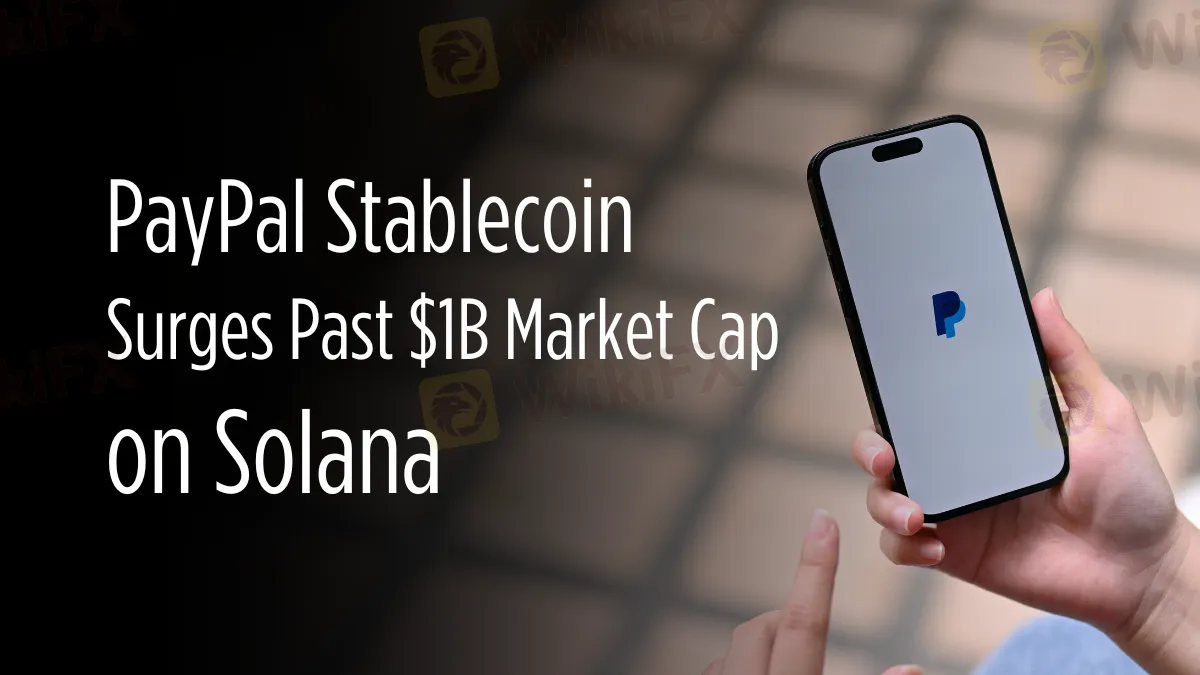简体中文
繁體中文
English
Pусский
日本語
ภาษาไทย
Tiếng Việt
Bahasa Indonesia
Español
हिन्दी
Filippiiniläinen
Français
Deutsch
Português
Türkçe
한국어
العربية
PayPal Stablecoin Surges Past $1B Market Cap on Solana
Abstract:PayPal's stablecoin PYUSD has surpassed a $1 billion market cap, driven by its expansion to Solana, positioning it as a significant player in the crypto space.

PayPal's stablecoin, PYUSD, has made significant gains in the cryptocurrency market, recently topping $1 billion in market value. This tremendous development demonstrates the growing importance of stablecoin, notably in the Philippines, where digital transactions are becoming more popular.
PayPals Entry into the Crypto Market
When PayPal originally released PYUSD, it was seen as a possible game changer in the cryptocurrency market. However, the first reaction on the Ethereum network could have been more enthusiastic, and the token's growth could have been more robust. Things didn't improve until late May when PayPal decided to extend PYUSD to the Solana network.
Expansion to Solana Fuels Growth
The choice to merge PYUSD and Solana proved to be a masterstroke. Within three months, the supply of PYUSD for Solana increased from zero to $650 million. This quick rise not only exceeded the supply on Ethereum but also established PYUSD as a serious competitor to existing stablecoins like Tether's USDT. According to DefiLlama statistics, PYUSD's supply of Solana increased by an astonishing 171% in the last month, representing a major milestone in PayPal's crypto goals.
Adoption in Decentralized Finance (DeFi)
One of the primary drivers of this development is PYUSD's inclusion with different decentralized finance (DeFi) protocols on Solana. Platforms such as Kamino, Drift, and Marginfi have provided increased returns for PYUSD deposits, attracting a huge number of customers. Anchorage Digital, a crypto custody service, has also given incentives for institutional deposits in PYUSD, increasing the stablecoin's attractiveness.

Challenges Ahead
Despite its quick rise, there are questions regarding the long-term viability of PYUSD's development, particularly when these incentives are removed. However, the stablecoin's great performance on Solana, as well as its increasing popularity on controlled exchanges like Crypto.com and decentralized financial protocols like Curve and Frax, point to a bright future.
PYUSDs Position in the Market
PYUSD supply has increased by 97% in the last month alone, propelling PayPal into the top 10 stablecoin issuers globally. With Tether USD dominating the niche with over 112 billion tokens in circulation, PYUSD's ascent is especially significant. On Ethereum, Paxos has the most PYUSD tokens, with 112 million, followed by Crypto.com, Defiance Capital, BitGo, and Curve.
As PYUSD gains traction, its impact in the Philippines and other developing nations is projected to rise, cementing PayPal's position as a significant participant in the global cryptocurrency industry.
Paypal Philippines Recent News
PayPal's cryptocurrency, PayPal USD (PYUSD), has just entered the Philippine market via a strategic relationship with GCash, a digital wallet and financial software supported by Globe. This decision represents a huge step forward in the integration of cryptocurrencies into Filipinos' everyday life.
GCash has announced that its customers may now access PYUSD via the GCrypto feature, an in-app service powered by PDAX. This allows GCash users to purchase, sell, or keep PYUSD tokens, giving them the advantage of quick, secure transactions with low price fluctuation. The integration of PYUSD on the GCash platform takes PayPal's use of numerous blockchains, including Solana, which is noted for its speed and cheap transaction fees.
Kenneth Chua, PDAX's Chief Business Development Officer, said that this project provides new options for Filipinos to use cryptocurrencies in realistic, daily circumstances. Winsley Bangit, Vice President and Group Head of New Businesses at GCash emphasized the company's commitment to inclusivity and economic growth, stating that digital finance, when combined with cryptocurrency, can help bridge the gap for unbanked and underbanked populations, fostering a more inclusive economy.
Learn how PayPal's PYUSD is transforming the crypto market in the Philippines. Get the full story on the WikiFX News page now!

Disclaimer:
The views in this article only represent the author's personal views, and do not constitute investment advice on this platform. This platform does not guarantee the accuracy, completeness and timeliness of the information in the article, and will not be liable for any loss caused by the use of or reliance on the information in the article.
Read more

Bitfinex Hacker Ilya Lichtenstein Sentenced to 5 Years in Prison
Bitfinex hacker Ilya Lichtenstein was sentenced to 5 years for stealing 120K Bitcoins as the cryptocurrency soars past $93K amid bullish market trends.

Italy’s CONSOB Blocks Seven Unregistered Financial Websites
Italy’s CONSOB ordered seven unauthorized investment websites blocked, urging investors to exercise caution to avoid fraud. Learn more about their latest actions.

CySEC Warns Against Unauthorized Investment Firms in Cyprus
CySEC warns investors about unregulated investment firms in Cyprus. Verify broker reliability through the WikiFX app to stay protected from scams.

STARTRADER Issues Alerts on Fake Sites and Unauthorized Apps
STARTRADER warns against counterfeit sites and apps using its brand name. Protect yourself by recognizing official channels to avoid fraudulent schemes.
WikiFX Broker
Latest News
CySEC Warns Against Unauthorized Investment Firms in Cyprus
Why Even the Highly Educated Fall Victim to Investment Scams?
Warning Against Globalmarketsbull & Cryptclubmarket
Dukascopy Bank Expands Trading Account Base Currencies
UK Sets Stage for Stablecoin Regulation and Staking Exemption
Axi Bids AUD 52M to Acquire Low-Cost Broker SelfWealth, Outbidding Competitor Bell Financial
Crypto Influencer's Body Found Months After Kidnapping
STARTRADER Issues Alerts on Fake Sites and Unauthorized Apps
Italy’s CONSOB Blocks Seven Unregistered Financial Websites
Bitfinex Hacker Ilya Lichtenstein Sentenced to 5 Years in Prison
Currency Calculator


